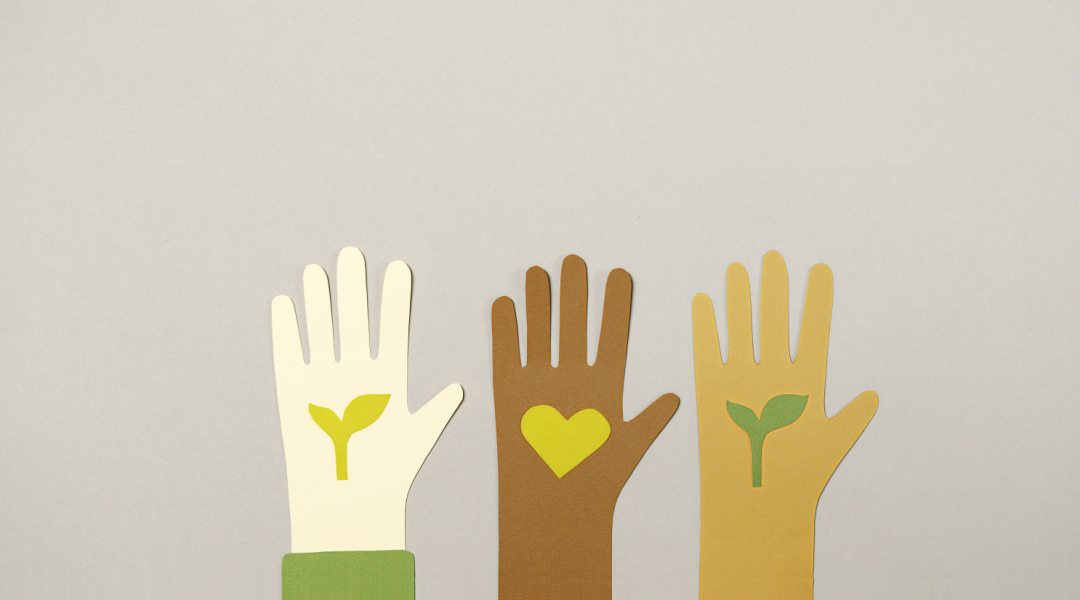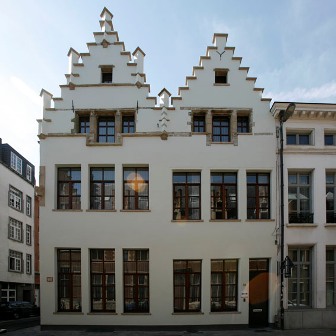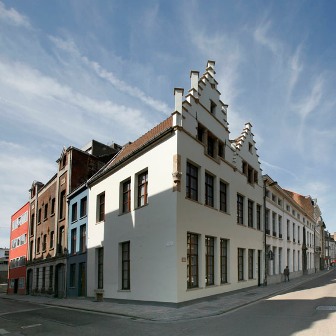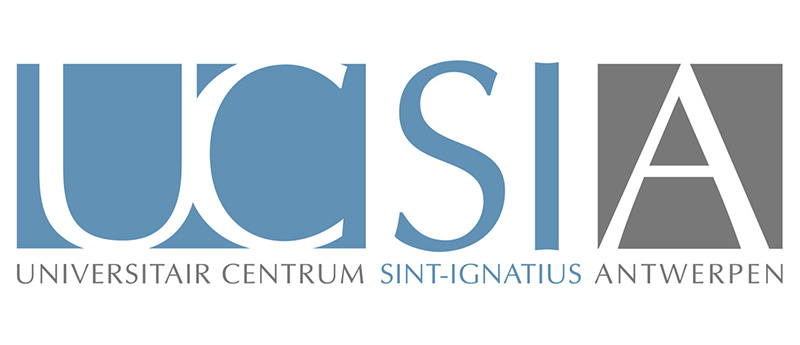
Environmental Mobility and Solidarity
webinar on 15 June 2021
Over the last decades, increasing attention has been given to environmental mobility by policymakers and academics. With the increasing visibility of climate change and its consequences, interest in this research topic has grown exponentially. In this webinar, we introduce the overall dynamics of interconnected systemic injustice and solidarity by putting upfront our personal and collective responsibility to tackle the ecological crisis, and present empirical evidence on how environmental mobility and adaptation to climate change looks like, by delving deeper into the environmental migration from Morocco to Belgium and immobility in Morocco.
Subsequently we discuss, from a religious perspective, how solidarity could take shape when dealing with environmental mobility and how to frame it as an issue of ‘climate justice’. The question of solidarity has emerged on the activist and policy agendas, as people affected by environmental changes are often not the ones that have contributed to them in the first place. Hence, solidarity seems appropriate, however, it remains unclear how it should be organized and by whom.
Watch the webinar!
There are various ways in which people have reflected upon some kind of solidarity and/or justice. Solidarity could emerge within existing migrant networks and be facilitated by policy makers. So far, there is still a large potential for religious organizations to play a role in the reduction of climate-related risks and disaster management that has not yet been explored.
Environmental migration and displacement has also been put on the agenda of religious congregations and organizations. For instance, the Pastoral Orientations on Climate Displaced People put ten guidelines to the fore to develop a response to deal with climate displaced people, including the acknowledgement of the climate crisis and displacement nexus, the promotion of awareness and outreach, the provision of alternatives to displacement, positively impacting policy making, cooperation in strategic planning and action, as well as the promotion of professional training in integral ecology and fostering academic research on this topic. It is not surprising that also religious organizations and institutions are putting this topic on their agenda as environmental mobility could threaten fundamental human rights (including adequate housing, food and water supply, etc) and could make people more in need of (international) solidarity both in terms of migration and adaptation to environmental changes. In this webinar, we aim to discuss and reflect on possible ways in which solidarity could be organized.
The webinar is co-organized by Lucia Korcsogová, participating in the European Leadership Programme as a fellow sponsored by UCSIA. The ELP is a Brussels-based project of the Jesuit European Social Centre (JESC) for master students to develop leadership skills through theoretical and practical methodologies and as such, to contribute to the formation of young leaders in the European Union.
Abstracts & Presentations
From Truth to Solidarity: The Painful and Uncomfortable Questions We Must Ask Ourselves if We Want to Build a World of Justice
by Josianne Gauthier, Secretary General of CIDSE
The past two years have shaken our certainties and exposed us to new forms of vulnerability, especially in the wealthier countries, but we are conscious that the underlying human and ecological crises have been brewing and spiraling for decades. Scientists, activists, and faith leaders have all contributed to a body of knowledge that confirms what we already knew or felt. Planet and people are hurting and it is at the hands of our own overexploitation and overconsumption and production, our dependency on (or addiction to) raw materials that are non-renewable, and our throw-away culture which justify the single use of plants, people, and whatever we extract, transform, or produce. The violence of this process sometimes escapes us, the consumers, but never those who pay the highest price.
For a brief moment in the past the 12 months, our attention was grabbed, and perhaps for the first times in their lives, certain people asked some important questions about how we live together on this planet, in our common home. What have we learned about ourselves, and what can drive a new kind of action and solidarity to help rebuild together? What is it about the racial, gender, social and ecological inequalities, so terribly visible and raw during the pandemic that has driven the crises so much closer to home and how do we emerge from that feeling of hurt and revolt and pain and transform it into action for justice? What lessons can we draw from Catholic Social Teaching, the recent Synod on the Amazon, the Encyclical Letter Fratelli Tutti on fraternity and solidarity? Indeed, we believe that not only are the injustices all interconnected, but so must our solidarity. We cannot address one systemic injustice without the others, and before we act, we must listen to all sources of wisdom and transform our way of seeing each other and the world we live in. Because in our rich diversity is that courageous and bold hope we need.
Josianne Gauthier is a Canadian lawyer with over 20 years of experience in international development and solidarity, with a strong focus on human rights. She joined CIDSE as Secretary General in 2017. Since joining CIDSE, she has been actively involved in networks and actions focusing on climate justice, systemic change, and promoting sustainable lifestyles.
A Qualitative Study of the Migration-Adaptation Nexus
to Deal with Environmental Change in Tinghir and Tangier (Morocco)
by Lore Van Praag, Director of the Centre for Migration and Intercultural Studies (CEMIS)
Over the last two decades, migration-as-adaptation discourses have theorized and studied how migration could facilitate adaptation to deal with the effects of adverse environmental change. However, contextual factors, such as migration trends and local social and economic contexts, as well as perceptions of this linkage have often been neglected. This presentation aims to understand how people perceive this relationship and whether and how migration, often in the form of remittances, is used for adaptation purposes.
For the study, 48 semi-structured interviews were conducted with inhabitants of Tangier and Tinghir (Morocco). These regions are confronted differently by environmental change impacts. While both face increasing precipitation and temperature changes, Tinghir is additionally confronted with drought, desertification, water scarcity, and a growing number of more extreme weather events. Furthermore, both regions receive internal migrants and experienced significant emigration towards Europe.
Results indicate that migration, as well as the sending of remittances, could produce a multitude of adaptation outcomes towards environmental change, resulting in an exacerbation of existing social vulnerabilities, alter economic development at the community level, and impact the development of alternative adaptation strategies, at both the individual/household and community levels. Findings demonstrate that migration-as-adaptation discourses must be considered within social, political, economic, and environmental contexts. These discourses should consider local migration histories and prevalent cultures of migration.
Lore Van Praag (MA, PhD Sociology, Ghent University) is Director of the Centre for Migration and Intercultural Studies at the University of Antwerp. Her research interests are ethnicity, gender, climate/environmental change, migration and education.
“You can’t even predict the rain anymore”
The Importance of Environmental Factors in the Migration Biographies of Moroccan Immigrants in Belgium
by Loubna Ou-Salah M.D., doctoral candidate at the Centre for Migration and Intercultural Studies (CEMIS)
Researchers face several difficulties when assessing how environmental factors interact with the drivers of migration. Recognizing the changes in one´s immediate environment can be an extended process, which then results in lack of awareness of climate change.
Taking a biographical approach, Loubna Ou-Salah´s presentation focuses on three cases of Moroccan first-generation migrants living in Belgium. Conceiving of migration as a multi-stage process, the objective of her study is firstly to demonstrate how environmental factors are closely linked to economic, political and social factors and play different roles in the development of migration aspirations. Secondly, it aims to understand how domestic and international migration processes are linked in the study of environmental migration.
We find that life stages mediate and determine the importance of environmental factors when migration decisions are made. Particularly during life stage transitions, the link between environmental factors and migration decision-making becomes more apparent. However, after major life stage transitions, people are less inclined to refer to this link. During these stages, the importance of environmental factors seems to be felt less strongly in migration trajectory narratives.
Loubna Ou-Salah is a PhD Candidate at the Centre for Migration and Intercultural Studies at the University of Antwerp. In her research, she is focusing on migration as an adaptation strategy for climate change.
The Pastoral Orientations on Climate Displaced People
by Alberto Ares SJ, Director of the University Institute for Studies on Migration Studies (IUEM) at the Comillas Pontifical University
Can we ignore the growing phenomenon of “environmental refugees”, that is, people who are forced to leave their homes due to the degradation of their natural habitats in order to face the danger and uncertainty of forced displacement? “No, we cannot!”
One of the factors that make the earth a unique home for life is its unique climate system. However, after more than 10,000 years of relative stability, our earth’s climate is changing rapidly due to human activities. The temperature rise of slightly above 1°C since the industrial age has caused tremendous suffering to millions of brothers and sisters around the world, not to mention the destruction of ecosystems and other biological communities.
The cry of a wounded humanity helps us to recognize that the climate crisis has a “human face”. The international community has recognized the severity of the climate crisis and has made tremendous efforts to resolve its impact through various agreements. Likewise, the Catholic Church recognizes and appreciates the efforts to establish a legal framework, collect data and conduct a rigorous analysis of the consequences of the climate crisis, as well as the involvement of many civil society actors in addressing this challenge. How can we continue to deal with this great challenge?
Alberto Ares Mateos, SJ. (PhD in International Migration and Development Cooperation) is Director of the University Institute for Studies on Migration Studies at the Universidad Pontificia Comillas. He specialized in social ethics, obtaining a Licentiate in Sacred Theology from Boston College; and a degree in Economics and Business.
Report
Does solidarity show us the way to cope with the disasters caused by climate change? If so, how and by whom should solidarity be organized? Peter Rožič, the director of the Jesuit European Social Centre, started by posing these questions both to the speakers and the audience. We clearly see evidence of these disasters happening around us by people becoming displaced because of environmental catastrophes. It is nevertheless difficult to prove the links between the man-made disasters and forced mobility and often these people, whose life has been made worse by the consequences of climate change, are not qualified as refugees. These and many other questions were addressed during this webinar, joining researchers and activists.
How did we come to normalizing the unacceptable life conditions some of us experience in our Common Home? Josianne Gauthier, the Secretary General of CIDSE, asked then elaborated on the path that leads to justice and solidarity, which is a learning process rather than a predetermined template of actions. A crucial part of this process is to listen to the signals all around us, and not to close our ears to the distressing, uncomfortable truths. The truth is that we are living unsustainably, beyond the planetary boundaries. The cost of the lavish lifestyle, however, is paid by the most vulnerable people with a lack of access to resources. As Josianne noted, we extract talent from people and resources from the Earth, to throw it away once consumed.
The pandemic exacerbated the human dignity crisis with disproportionate suffering of marginalized groups. Paradoxically, the health crisis also emphasized how dependent the wealthier are of the marginalized groups to keep up their way of life. This approach towards our social environment has to change radically if we want to save the planet for the future generations. Decision we make have an impact on seven upcoming generations, as such illustrating how connected our present actions are with both the past and the future. This awareness of our interconnectedness should guide us in our decision-making and justice building.
While promoting and advocating a sustainable lifestyle, global solidarity and development aid, CIDSE is encouraging us to consider the following advice. Often the response to the climate crisis is more isolated than the actual causes, which puts social activists into a frustrating position. Actions for solidarity and justice have to be harmonized, coherent and connected to local processes, while recognizing urgency and scale of the problem. Most importantly, we have to change our hearts and care about others´ lives as much as about ours. It is not truth that there is nothing we can change. Instead, we have to replace this belief with hope and action.
Such actions are necessary from various fields, academia is not an exception either. Lore Van Praag, the Director of the Centre for Migration and Intercultural Studies (CeMIS) at the University of Antwerp, together with Loubna Ou-Salah, a PhD Candidate at CeMIS are devoted researchers focusing on migration as an adaptation strategy for climate change. Their empirical studies bring closer to the reality of people affected by environmental changes.
Lore Van Praag started her lecture by presenting the changes in our perceptions towards the links between climate change and mobility. While in the 90s the first conceptualization associated environmental migration with mass displacement eventually leading to a global security challenge, recently new approaches emerged emphasizing the adaptation capabilities of migration to deal with environmental change. The adaptation strategy framework has a more holistic approach, and considers migration to have a potential to reduce the vulnerabilities of social or biological systems to environmental change. According to this approach, migration could reduce demographic pressures and facilitate knowledge sharing within migrant networks. However, critics warn that this could put too much pressure on migrants, who already have a difficult position in supporting themselves and their relatives, and are as such expected to solve another social problem out of their reach. Further, access to migrant networks and opportunities to move are not available to everyone, and often those who are the most dependent on the environment have less options to move.
The empirical study presented focused on two regions in Morocco, Tangier and Tinghir, both of which have history and connections of migration to Belgium. The consequences of environmental change are more pronounced in Tinghir, where the importance of agriculture is higher. The remittances sent to families in the home country are used to cope with daily challenges and to improve the standards of living. Migrants also invest money in local projects at home, however, these projects were not necessarily linked to tackle climate change. People invest in agriculture, but it is not in a form of structural adaptation and does not necessarily benefit the entire community. In Tinghir, people more explicitly used remittances to become less dependent on agriculture because of water scarcity and to engage in other professions.
On a community level, it is possible to use remittances in a more coordinated way to cope with the devaluation of agriculture and land degradation. But it is necessary to have a clear view on environmental changes and ways to cope with it, and initiatives need to be supported by upper levels of governance as well. Migration is not a straightforward way to facilitate climate adaptation, its potential depends on how migration flows and remittances adjust to this context. As Van Praag concludes, solidarity should support community level strategies and help to set up platforms to coordinate climate adaptation, in line with governmental initiatives.
Loubna Ou-Salah takes a biographical approach in her research, focusing on three cases of Moroccan first-generation migrants living in Belgium. The objective of her study is firstly to demonstrate how environmental factors are closely linked to economic, political and social factors and play different roles in the development of migration aspirations. During life stage transitions, such as entering the labour market, marriage or retirement, the link between environmental factors and migration decision-making becomes more apparent.
Morocco has been clearly affected by climate change, causing erosion of the land. Interviews with migrants from an agricultural background helped Ou-Salah to better comprehend the local discourses linked to environmental changes. She introduced 3 respondents – Khadija, Fatima and Rachid.
Khadija worked all her life in the agricultural sector and decided to migrate in her fifties, after her husband died. Khadija was aware of the lack of predictability and the decreases in income from agriculture, therefore she did not encourage her children to stay in this sector. The transition to widowhood changed here reality and she decided to move to Belgium following her children to be close to her family. Back in Morocco, Fatima grew fruits and vegetables and sold them the market. She lived alone for a long time without the company of her husband, who was involved in seasonal jobs to provide for the family, although their livelihoods were not secured. Fatima migrated to Belgium based on family reunification procedures to find alternative ways to secure their income. Rachid could not continue their families’ business on the family land due to drought, and it was about time for him to find stability and start his own family. This difficult situation made migration more appealing. In his narrative, environmental changes were not directly linked to the drivers of migration, instead he referred to economic concerns, marriage and family reunification.
Ou-Salah presented the main findings of her study, concluding that the perceived importance of environmental factors varies during different life transitions, and environmental factors do not always remain consistently and strongly present throughout a migration trajectory. The effects vary according to economic activities, gender roles and responsibilities within the household.
Alberto Ares Mateos, SJ., the Director of the University Institute for Studies on Migration Studies at the Universidad Pontificia Comillas, with a thorough field experience, calls us not to ignore the growing phenomenon of “environmental refugees”, that is, people who are forced to leave their homes due to the degradation of their natural habitats in order to face the danger and uncertainty of forced displacement. He referred to the human face of the climate change and described the efforts religious organizations and the Catholic Church are making, in order to cope with the severity of these issues. Alberto Ares further mentioned the necessity to establish a legal framework, collect data and conduct rigorous analysis of the consequences of the climate crisis, as well as the involvement of many civil society actors in addressing this challenge.
The Church introduces the Pastoral Guidelines on Climate Displaced People and an online platform devoted to this topic, suggesting appropriate pastoral responses to provide a set of considerations to assist displaced people and practical responses to their needs. The Guidelines are the results of careful listening to local churches, religious congregations and Catholic organizations working on the field.
The Pastoral Guidelines addresses the following 10 points:
- Acknowledging the Climate Crisis and Displacement Nexuss
- Promoting Awareness and Outreach
- Providing Alternatives to Displacement
- Preparing People for Displacement
- Fostering Inclusion and Integration
- Exercising Positive Influence on Policy-Making
- Extending Pastoral Care
- Cooperating in Strategic Planning and Action
- Promoting Professional Training in Integral Ecology
- Fostering Academic Research on CCD
Alberto Ares presented best practices from Catholic organizations for each point from all around the Global South. Primarily, it is crucial to acknowledge that the climate crisis is real and requires an integral response. This is a journey the Church is called to care about for a Common Home and Family.

UCSIA
Koningstraat 2
B-2000 Antwerpen
info@ucsia.be
Tel. +32 (0)3 265 49 60
Voorlopige locatie tijdens de renovatiewerken:
Blindestraat 14, 2000 Antwerpen

